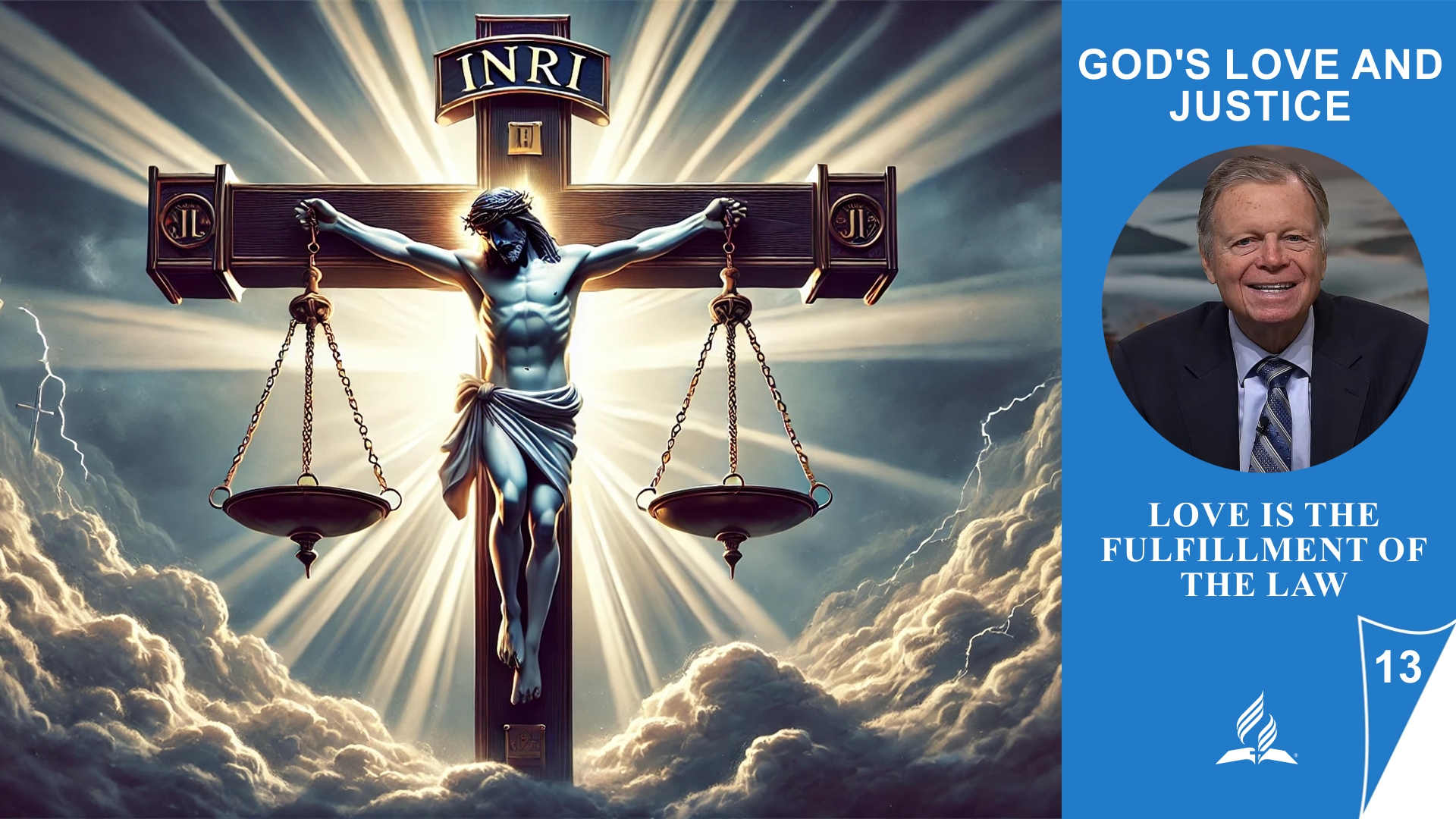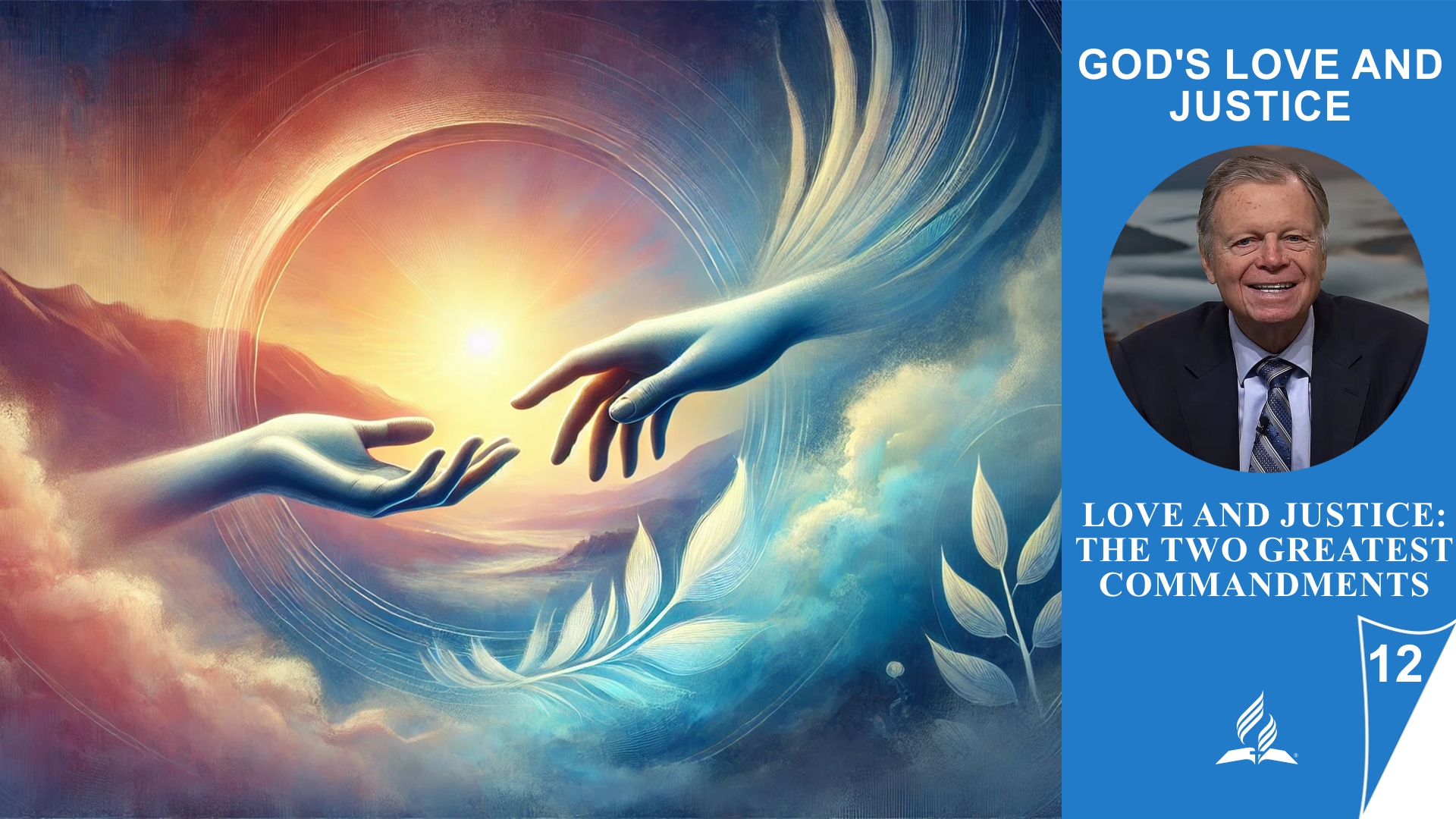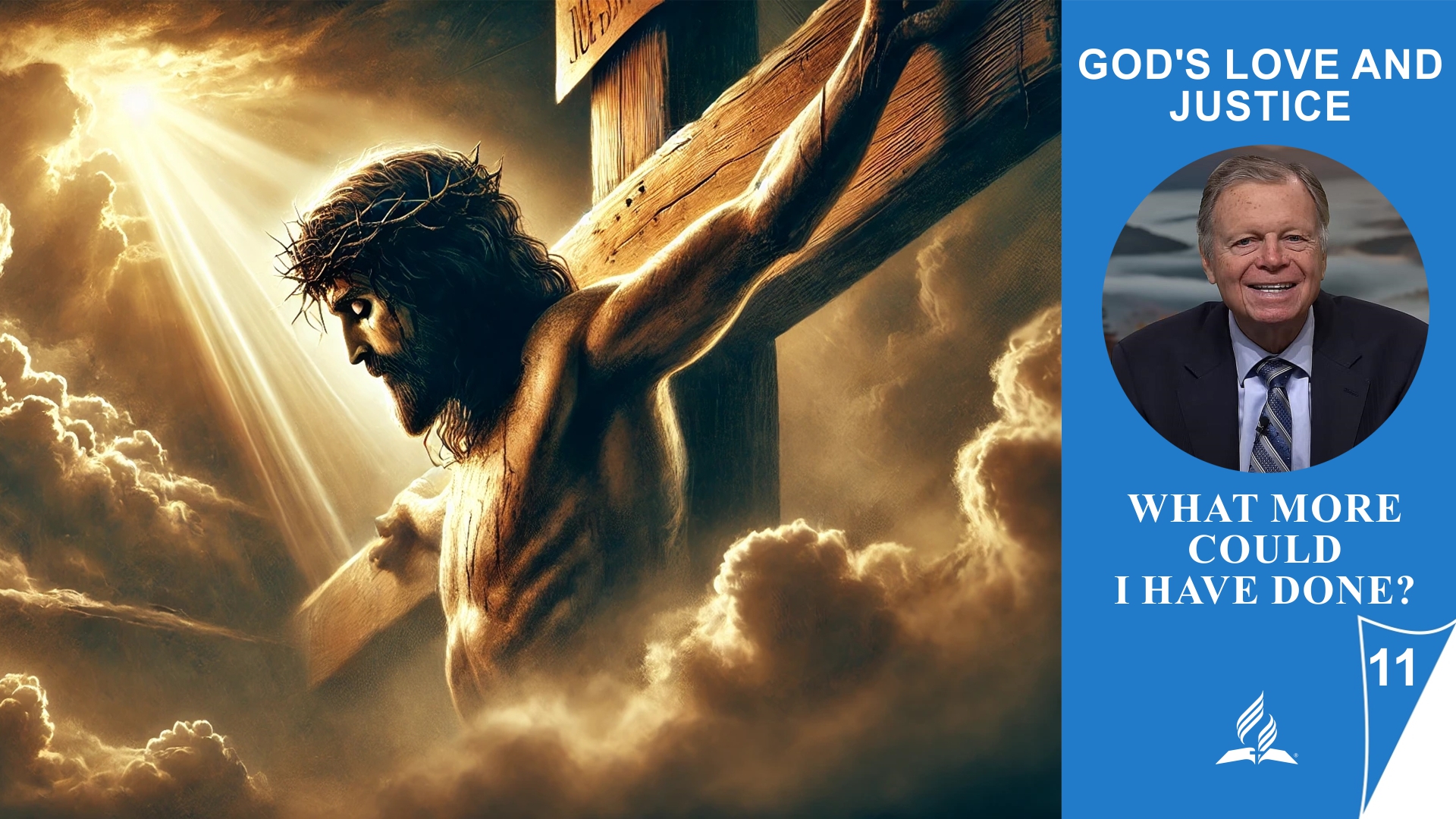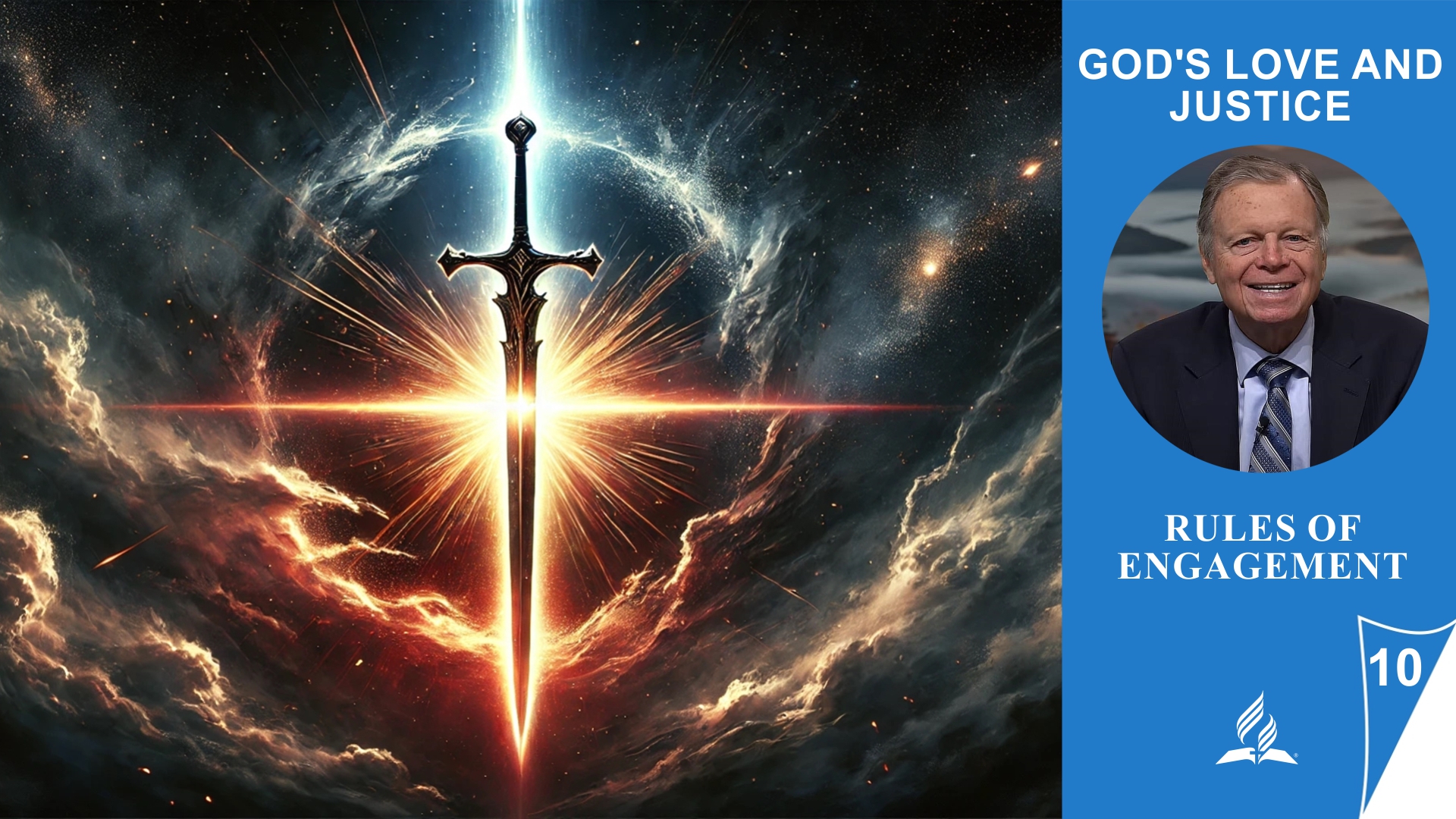
The God of Love and Justice – Lesson 12.Love and Justice: The Two Greatest Commandments | Sabbath School with Pastor Mark Finley

Series THE GOD OF LOVE AND JUSTICE with Pastor Mark Finley |
Lesson 12.Love and Justice: The Two Greatest Commandments |
Love and Justice – God’s Highest Calling |
Lesson 12 focuses on the two greatest commandments: love for God and love for one’s neighbor. Jesus teaches that all other commandments are based on these two principles. Justice is not an abstract idea but an expression of lived-out love, especially for the weak and oppressed. At the same time, the Bible warns against the greatest sins—idolatry and lovelessness—which go against God’s will. Through the Parable of the Good Samaritan, Jesus demonstrates that true neighborly love knows no boundaries. This lesson challenges us to make our faith visible through concrete acts of love and justice.
Memory Text: 1.John 4:20 – “If someone says, ‘I love God,’ and hates his brother, he is a liar; for he who does not love his brother whom he has seen, how can he love God whom he has not seen?”
Content:
12.1 The Two Greatest Commandments
Love for God and People as the Foundation of Our Lives
Jesus summarizes the entire law in two commandments: love for God and love for one’s neighbor. These two principles are inseparable—true love for God is reflected in genuine love for others. The rich young man sought eternal life, but his heart was attached to worldly possessions. Jesus called him to let go and find true fulfillment in God. This encounter reminds us that our greatest treasure is not material wealth but a living relationship with God. What holds us back from following this divine love with an undivided heart?
12.2 The Two Greatest Sins
Idolatry and Lovelessness – The Two Greatest Sins
If love for God and one’s neighbor are the highest commandments, then their opposites—idolatry and lovelessness—are the gravest sins. Idolatry means putting something else above God, which destroys our relationship with Him. Lovelessness toward others directly contradicts God’s nature and His will for human relationships. Zechariah emphasizes that injustice and hardness of heart toward others are as serious as breaking the first commandment. These two greatest sins separate us from God’s love and from one another. True discipleship means recognizing these obstacles and intentionally choosing to live in love.
12.3 God Loves Justice
God’s Heart Beats for Justice
God loves justice and calls His followers to actively support the oppressed. Psalm 82 shows that true justice is not just an ideal but a divine mandate, which must be made visible in our treatment of the weak. The Bible makes it clear that injustice is not just a social issue but also a spiritual one. Those who love God cannot remain indifferent to suffering and wrongdoing. Micah 6:8 reminds us that true piety is expressed through mercy and humility. Our faith comes alive when we make God’s justice visible in our daily lives.
12.4 Called to Establish Justice
Justice as a Lived-Out Faith
God continuously calls His people to actively pursue justice rather than merely fulfilling outward religious duties. The prophets Isaiah and Jeremiah strongly emphasize that true knowledge of God is inseparable from standing up for the weak. Jesus reaffirms this call by rebuking the Pharisees for focusing on minor details while neglecting what truly matters—justice, mercy, and faith. Even today, the question remains: Are we putting our faith into action by striving for justice, or are we caught up in outward forms? True discipleship means actively making God’s justice visible in our lives. Only then does our faith become authentic and alive.
12.5 Who Is My Neighbor?
True Neighborly Love in Action
The Parable of the Good Samaritan illustrates that true neighborly love knows no boundaries—our neighbor is anyone in need, regardless of origin or status. Jesus makes it clear that mercy is not just a commandment but a heart attitude that must be actively lived out. His own life serves as an example—He came to bring justice and stand with the oppressed. The Psalms testify that God cares for the needy and calls us to do the same. While our help may not be miraculous like Jesus’, it can still be a sign of God’s love and care for others. Every act of justice and kindness makes God’s kingdom more visible in this world.
12.6 Summary
Love and Justice – The Heart of God’s Commandments
Lesson 12 emphasizes that love for God and one’s neighbor is at the core of all commandments. Jesus shows that true justice flows from lived-out love rather than from mere religious obligations. Idolatry and lovelessness are the greatest sins because they separate people from God and from each other. God calls us to actively seek justice, especially for the weak and oppressed. The Parable of the Good Samaritan reminds us that neighborly love has no boundaries. Those who truly receive God’s love will reflect it through acts of mercy and justice in everyday life.
The God of Love and Justice – Lesson 11.What More Could I Have Done? | Sabbath School with Pastor Mark Finley

Series THE GOD OF LOVE AND JUSTICE with Pastor Mark Finley |
Lesson 11.What More Could I Have Done? |
God’s Love in the Cosmic Conflict |
In Lesson 11, we focus on the central question: What more could I have done? Despite Satan’s deceptions, God has shown in every respect that He is just and full of love. Through the sacrifice of Jesus, God’s true nature has been fully revealed, and the enemy has been defeated. Yet human free will remains intact—each person must decide for themselves which side they will stand on. God’s plan of salvation demonstrates that He has done everything possible to save us without violating our will. The question now is: How will we respond to His love and His sacrifice?
Memory Text: John 18:37 – “Pilate therefore said to Him, ‘Are You a king then?’ Jesus answered, ‘You say rightly that I am a king. For this cause I was born, and for this cause I have come into the world, that I should bear witness to the truth. Everyone who is of the truth hears My voice’. ”
Content:
11.1 Christ the Victor
Christ, the Triumphant King
Jesus Christ has won the final victory, even though the enemy still rages. The devil may be described as the deceiver, accuser, and illegitimate ruler of this world, but Christ confronts him with truth, righteousness, and love. Through His sacrifice on the cross, Jesus exposed Satan’s deceptions and brought down his kingdom. Our daily trust in this victory is crucial—because the key lies in embracing Christ’s promises in our everyday lives. By following Him, we are already on the winning side and can overcome through Him.
11.2 The Just and the Justifier
Christ—the Righteous One and Justifier
On the cross, Jesus reveals both God’s perfect justice and His infinite love. While Satan accuses God of injustice, Christ refutes these lies through His sacrifice and grace. His death shows that God is not only just but also the One who justifies the guilty. In doing so, the enemy is fully unmasked, and his kingdom is destined to fail. Those who trust in Christ can be certain that God’s love endures even in suffering and trials. The victory of the cross assures us that goodness will ultimately triumph.
11.3 The Song of My Beloved
God’s Perfect Love and Justice
God has done everything to save humanity and pave the way to eternal life. The Song of the Vineyard demonstrates that He left nothing undone to care for His people and help them bear good fruit. Yet the free will of humanity often leads to rejection and unfaithfulness. On the cross, God ultimately revealed His love by becoming the sacrifice Himself to redeem us. When we look at the cross, we realize: God could not have done more—His love is complete. The question remains: How will we respond to this incomparable gift?
11.4 Christ’s Parable of the Vineyard
The Greatest Love—God’s Ultimate Sacrifice
In the Parable of the Vineyard, Jesus shows that God spared no effort in seeking to save humanity. He sent prophets, but they were rejected. Finally, He gave what was most precious—His own Son. Yet Jesus was also rejected and crucified. On the cross, God’s immeasurable love and His deep sorrow over sin were revealed. If there had been a better way, God would have chosen it—but only through the cross could justice and love be perfectly displayed. Our redemption cost God infinitely, but He paid the price out of love for us.
11.5 The Vindication of God’s Name
God’s Name Will Be Vindicated
In the end, God will be proven completely just and loving. His work in the plan of salvation will show, beyond any doubt, that He has always been fair and merciful. Even now, He invites us to consider His nature and recognize that His judgments are righteous. In eternity, we will understand why He acted as He did, and we will acknowledge His wisdom and justice. Every creature will confess that Jesus is Lord, and God’s name will be fully vindicated. His love and faithfulness are unshakable—now and forever.
11.6 Summary
God’s Perfect Love and Justice
God has done everything to save humanity and reveal the truth about His character. Through Jesus Christ, He has defeated the enemy, affirmed His righteousness, and demonstrated His infinite love on the cross. The cosmic conflict could not be ended by force but by the complete revelation of God’s character. Despite all rejection, He even gave His own Son to redeem the world. In the end, every knee will bow and acknowledge that God’s ways are just and good. The question remains: How will we respond to His incomparable offer of love and grace?
The God of Love and Justice – Lesson 10.Rules of Engagement | Sabbath School with Pastor Mark Finley

Series THE GOD OF LOVE AND JUSTICE with Pastor Mark Finley |
Lesson 10.Rules of Engagement |
God’s Rules of the Game in the Cosmic Conflict |
The great battle between good and evil is not a chaotic power struggle but follows certain rules that reflect God’s justice and love. God does not force anyone to worship Him; rather, He always acts in harmony with His principles. Even angels and heavenly powers are subject to these established boundaries, as clearly shown in Daniel 10 and Job. Satan is temporarily granted power, but it is not unlimited—God’s plan ultimately leads to the triumph of good. Faith and prayer play a crucial role, enabling divine intervention without violating the rules of the conflict. This lesson helps us better understand God’s actions within the tension between love, freedom, and justice.
Memory Text: 1.John 3,8 – “He who sins is of the devil, for the devil has sinned from the beginning. For this purpose the Son of God was manifested, that He might destroy the works of the devil.”
Content:
10.1 An Angel Delayed
The Invisible Battle: God’s Power and the Limits of Coercion
The account in Daniel 10 shows that, within the cosmic conflict, there are certain limits even for God’s angels. Though God is all-powerful, He does not always intervene directly or immediately but allows spiritual forces to contend with each other. This underscores that God acts according to principles based on love and freedom rather than coercion. The struggle of the angel Gabriel with the “prince of the kingdom of Persia” demonstrates that evil powers attempt to hinder God’s plans, yet they ultimately cannot prevail. These “rules of the game” in the conflict remind us that divine power is exercised with wisdom and patience. We also learn that our prayers and faith play a part in this invisible battle.
10.2 The Dragon of Revelation
The Limited Triumph of Evil
Revelation depicts Satan as a dragon who tries to undermine God’s rule and deceive the world. He grants authority to an earthly power to persecute God’s people and claim worship for itself. Yet even though his power appears immense, it is not unlimited—God sets clear temporal and spiritual boundaries for him. Satan knows he has only a short time before his final downfall is sealed. These prophecies remind us that evil may triumph for a while, but God’s righteous kingdom will ultimately prevail. The promise of Revelation 21:4 gives us hope: suffering will end, and God’s kingdom of peace will endure forever.
10.3 The Case of Job
A Battle for Trust and Justice
The story of Job provides profound insights into the dynamics of the great conflict. Satan questions Job’s integrity, claiming that his reverence for God stems only from divine protection. God then permits Job to be tested but sets clear boundaries that Satan cannot cross. This episode shows that there are rules of the game in the cosmic conflict that uphold God’s principles of love and justice. Despite his suffering, Job remains faithful to God, thus refuting Satan’s accusations. The heavenly courtroom scene makes it clear that the great conflict is fought not only on earth but also in heaven, with far-reaching consequences for the entire universe.
10.4 The (Temporary) Ruler of This World
The Limited Power of Evil
In the New Testament, Satan is called the “ruler of this world,” but his dominion is neither absolute nor permanent. God allows him to operate only within certain rules of the game, which limit both Satan’s actions and God’s own intervention. These restrictions safeguard human free will and ensure that God’s government is based on justice and love, not coercion. Christ came to break Satan’s power and destroy his dominion—a victory sealed by His death and resurrection. Nevertheless, evil remains for a time, until God ultimately eradicates it. The knowledge that Satan’s rule is only temporary offers hope for a future free from suffering and injustice.
10.5 Limits and Rules
God’s Justice in the Cosmic Conflict
The great conflict is not merely a struggle for power but a dispute over God’s character, His justice, and His sovereignty. Instead of immediately eradicating evil, God allows a fair presentation of evidence so the truth can be revealed. These “rules of the game” set limits within which both God and Satan must operate, preserving free will and divine principles. Faith and prayer seem to play a role in how and when God intervenes, though they are not the only factors. Despite the existing boundaries, evil will ultimately be defeated, and God’s kingdom of love will stand forever. The promise of a new world without suffering assures us that God’s plan is perfectly just and worthy of our trust.
10.6 Summary
Rules of the Game in the Cosmic Conflict
The great conflict between God and Satan follows specific rules of the game that limit both the workings of evil and God’s intervention. God does not act arbitrarily but remains true to His principles of love and justice. Satan may temporarily hold power in this world, yet his reign is constrained and will ultimately end. The story of Job and biblical prophecies show that God does not eliminate evil by mere force, but through a just demonstration of evidence. Faith, prayer, and the rules of the cosmic conflict influence when and how God intervenes. Despite the present suffering, the Bible assures us that God’s kingdom of peace and love will finally triumph.
The God of Love and Justice – Lesson 9.The Cosmic Conflict | Sabbath School with Pastor Mark Finley

Series THE GOD OF LOVE AND JUSTICE with Pastor Mark Finley |
Lesson 9.The Cosmic Conflict |
Origin, Nature, and Hope |
The cosmic conflict is an invisible but real battle between good and evil, which began in heaven and now affects all humanity. This lesson highlights how Satan, through pride and rebellion against God, sowed doubt about God’s character. The conflict revolves around trust, worship, and the question of whether God’s rule is just and loving. Despite Satan’s deceptions, the Bible reveals God’s patience and His plan to ultimately overcome evil. We are invited to trust God’s truth and remain steadfast in this spiritual battle.
Memory Text: Genesis 3,15 – “ ‘And I will put enmity between you and the woman, and between your seed and her Seed; He shall bruise your head, and you shall bruise His heel’ ”
Content:
9.1 An Enemy Has Done This
An Enemy Has Sown Evil – God’s Patience in the Cosmic Conflict
The parable of the weeds among the wheat clearly shows that evil does not come from God but is the work of an enemy—the devil. In a world originally created good by God, Satan sowed discord and suffering. God’s decision not to immediately eliminate evil demonstrates His patience and desire to avoid harming the righteous. Prematurely uprooting the “weeds” could endanger the “wheat,” representing people still on their way to the truth. However, this patience does not mean tolerating evil but shows that God will judge justly in His time. For us, this means staying vigilant while approaching others with mercy and patience.
9.2 The Origin of the Controversy on Earth
The Origin of Evil – A Conflict Over Trust and Truth
God created the world as “very good” (Genesis 1:31), but evil entered through the serpent’s deception, twisting God’s Word and sowing doubt. The cosmic conflict began with the question of whom to believe—God or the enemy’s temptation. Eve’s choice shows how distrust leads to sin and separation from God. Yet, amid this fall, God gives hope: the promised “seed of the woman” (Genesis 3:15)—a reference to the Messiah—will ultimately triumph over evil. This conflict reminds us how vital trust in God is and that He has a plan of salvation.
9.3 The Origin of the Controversy in Heaven
The Fall of Lucifer – Pride as the Source of the Heavenly Conflict
The cosmic conflict did not begin on Earth but in heaven, when Lucifer, a perfect and beautiful angel, became proud and sought to exalt himself above God. Ezekiel 28 and Isaiah 14 describe how this once-honored cherub fell through self-exaltation and envy. His moral freedom allowed him to choose rebellion, explaining the origin of evil. Lucifer’s pride turned admiration into rebellion, sowing distrust against God. Yet this story shows that love and freedom are inseparable—without free will, true love isn’t possible. God permits the conflict to dispel doubts throughout the universe and reveal His justice.
9.4 If You Worship Me
The Battle for Worship – Jesus’ Victory Over Temptation and Deception
The cosmic conflict between Christ and Satan becomes particularly clear in the wilderness. Satan tried to manipulate Jesus’ hunger, trust, and worship, but Jesus resisted every temptation through God’s Word. The third temptation reveals Satan’s true goal: he desires the worship due to God alone. Jesus’ resolute response shows that true worship belongs only to the Creator. This battle affects us too—we face daily temptations pulling us away from God. Like Jesus, we can stand firm using Scripture as a weapon in spiritual warfare. Being aware of this unseen conflict helps us remain vigilant and strong in faith.
9.5 The Nature of the Cosmic Conflict
A Battle for Trust – God’s Truth Against Satan’s Lies
The cosmic conflict is not a battle of power but of character and truth. Satan questions God’s love and justice, spreading lies to sow mistrust. Jesus calls him the “father of lies” (John 8:44), whose strategy is deception and slander. God, in contrast, responds not with force but by revealing His just character through truth and love. The conflict revolves around whom creation trusts—Satan’s accusations or God’s self-revelation in Christ. Ultimately, God’s patience exposes Satan’s deceptions and reveals the goodness of His law and character to the entire universe.
9.6 Summary
The Cosmic Conflict – A Battle Over Truth, Trust, and Worship
Lesson nine explores the cosmic conflict between God and Satan, which began in heaven and expanded to Earth. Satan questioned God’s character and sowed doubt about His love and justice. The fall in Eden and Jesus’ temptation in the wilderness show how this conflict centers on trust, worship, and obedience. While Satan operates through deception and lies, God reveals His truth through patience, love, and justice. Ultimately, God’s character is fully vindicated, and evil is defeated. This lesson encourages us to hold firmly to God’s Word and trust Him in this spiritual battle.
- « Previous Page
- 1
- …
- 5
- 6
- 7
- 8
- 9
- …
- 385
- Next Page »
